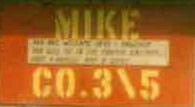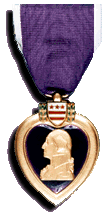Joe
Mirgeaux
Joe
Mirgeaux was in my platoon in Officers Candidate School in 1965.
In addition to probably 10 other enlisted candidates in our
class, both Joe and I had prior service in the Marine Corps.
I believe Joe was a Sergeant and I was a Corporal.
Joe
and I graduated and moved on to The Basic School where we competed
for top honors--neither winning anything, but enjoying ourselves.
The honor just to be a second lieutenant of Marines was a special
award for each of us.
Through
both OCS and The Basic School, Joe was the epitome of a Marine--Thoroughly
faithful, well versed in Marine Corps history and tradition,
and as GUNG HO a Marine as I had met in my short time in the
Corps. Physically tough and wiry, he finished high in academics
and physical fitness. He was enormously proud to rise through
the ranks and determined to be an outstanding officer of Marines.
Joe
was the only officer in our class to buy a boat clock to wear
for special ceremonies, and, of course, for the Marine Corps
Ball that year. The rare photo of Joe with a friend at the 1966
Marine Corps Ball is the only photo I have of him.
There
was no question which MOS we would choose--we left our Basic
School Platoon Commander three choices--Infantry, Infantry,
and Infantry. And we got our choice! Both were being assigned
to the First Marine Division and eventually to the same Battalion,
3rd Bn., 5th Marines.
Joe
and I were both gamblers. In fact, at one of the Basic School's
informal poker games, we both lost one month's salary on Acey
Ducey! Still hear Joe's high-pitched chuckle and his easy going
way.
After
graduation from The Basic School, we traveled across the United
States stopping off at Joe's home in Cape Gearaud, MO. to visit
his family before heading to a Vegas stopover before reporting
into our next command. We had heard that Vegas catered to Marines
in uniform and both Joe and I proudly showed up in one of the
casinos in our best uniform. And yes, we had free rooms, free
drinks, and free food for the weekend we stayed there. Only
thing I remember is Joe up some $2500 at Blackjack, and I left
him to get sleep since I lost all my money. At 4pm Joe shows
up in the room with his pockets turned inside out, with a high
cackled giggle, and ready for bed. In the little timeframe of
life I knew Joe, he seemed to be fun loving and joking with
everyone, but highly driven to succeed at whatever he attempted.
Once
we reached Camp Pendleton in early December 1965, and then assigned
to the 3rd Bn. 5th Marines forming at Camp Margarita, we soon
lost touch. I was assigned as the Platoon Commander of 2d Platoon,
M Co 3/, and Joe was assigned to the S-4 of the Battalion and
sent to Embarkation School.
Embarkation
School is a grueling, high intensity, school necessary to train
both officers and enlisted Marines the techniques to load units
aboard ship to enable the commander to tactically offload the
unit successfully according to the mission of the unit. Much
easier said than done. The lives of the Marines aboard the amphibious
ships are at stake if the embarkation is not done properly.
After Joe Mirgeaux finished schooling, the lives of the Battalion
fell into his hands. LtCol. Bronars, the Battalion Commanding
Officer, designated Joe as the Battalion Embarkation Officer.
Obviously, Joe's talents highly impressed the boss! As anyone
who every met Joe will tell you, he had a sharp mind and he
was driven no matter what task assigned.
In
order to outline some of the enormous responsibilities of Lt.
Joe Mirgeaux, the Embarkation Officer of the Battalion Landing
Team, I have borrowed significant paragraphs from LtCol. Alex
Lee's book 'Utter's Battalion'. This will give you a better
appreciation of Joe's dedication to the Marines of 3rd Bn. 5th
Marines during the spring and summer of 1966.
Embarkation
of 3/5 bound for Okinawa was Joe's initial test using the training
of Embarkation School and in anticipation of future combat loading
for the ultimate test--Vietnam. Combat loading of an assault
shipping begins by identification of the vehicles or pieces
of equipment that will be wanted on the beach absolutely last.
Those items will follow ashore behind every other vehicle or
piece of equipment assigned to the battalion.
Thus,
they become the first to be positioned on the schematics and
the first to be loaded in the ship's hold or on the vehicle
platforms below deck. Once that final item is assigned a spot,
the embarkation planning begins to become reality. If the whole
task is done right, the key vehicle or piece of equipment that
is wanted first on the beach can be found, ready to go, on the
highest equipment deck of the assault ship. It should be sitting
there ready to go ashore on time with the unit that needs it.
The
embarkation process is a highly complex procedure similar to
solving a three dimensional puzzle. The ship space cannot be
changed and the proper use of that space is critical. In many
cases, vehicles and equipment must be lifted into spaces with
only inches to spare. Combat loading a ship, and in the case
of Joe's problem, the three amphibious ships for the lift of
the battalion, is not an easy task for a peacetime deployment.
For a full deployment for war, Joe and his team worked with
very heavy loads on the vehicles, with all manner of extra items
lashed on the outside of vehicles, and with some attached units
that arrive bringing an extra trailer or two. Buried under a
gigantic load of nearly impossible problems, the embarkation
team relished the task.
All of this complexity fell on Joe's shoulders, who worked almost
without rest to get the Battalion loaded from California to
its initial port of debarkation in Okinawa.
While
the infantry companies were training in the jungles of the Northern
Training area of Okinawa, Joe and his fellow embarkation officers
prepared the ships for combat loading for training operations
in the Phillippines before becoming the Special Landing Force,
Vietnam.
As
the bridge partner for LtCol. Bronars, I heard the greatest
respect for the talents and motivation of Joe as the primary
embarkation officer of the Battalion. It was obvious at that
time that Joe would get his platoon as soon as an opening occurred
and someone in the Battalion could safely carry the critical
mantle of embarkation officer.
Joe
embarked the Battalion for combat training in the Phillippines
as a precursor for our final test-Vietnam. In May 1966, Joe
had us combat loaded for Vietnam and we assumed the role as
The Special Landing Force, Vietnam with the responsibility to
land ashore anywhere in Vietnam where the Commander of US Forces,
Vietnam needed critical support. That request came on 18 June,
1966 with Operation DECKHOUSE I in support of an Army Airborne
Brigade near Song Cau, Phu Yen Province, Vietnam and shortly
thereafter to again support the Army in Operation NATHAN HALE.
The debarkation and subsequent embarkation following these two
operations worked like clockwork and the Commanding Officer
of the Battalion was quite proud of the work done by Joe's team.
Returning
back to the Phillippines after NATHAN HALE, Joe Mirgeaux worked
tirelessly to reload the amphibious ships in our two weeks'
stay there before returning to Vietnam. I do not remember seeing
Joe during this time. I was concerned with my platoon and Joe
was exhausting himself for the upcoming operation.
We
set sail for Vietnam during the early parts of July 1966 and
landed near the DMZ of Vietnam on Operation DECKHOUSE II, an
area nicknamed "Street Without Joy" by Bernard Fall.
This area is the Gio Linh District, Quang Tri Province, just
north of the City of Dong Ha. But the Battalion found itself
only spending a short couple of days in this area.
Early
on the morning of the 18th July 1966, our Battalion landed deep
in the northern mountains of S. Vietnam. Two days later when
Lt. Steve Lindblom was medically evacuated due to deafness caused
by an bomb explosion, LtCol. Bronars finally sent in Joe Mirgeaux
to replace Steve as the 3rd Platoon Commander, M Co. 3/5.
During
that day the company maneuvered up several large hills looking
for a suspected NVA regimental headquarters, and towards the
later part of the afternoon traveled down a steep gully and
surprising a large NVA unit outside their bunkers on both sides
of a narrow stream bed. My platoon had the right side, and the
Company Commander, Capt. Dell Pettengill, sent Joe and his platoon
on the left side to clear the bunkers and the high ground above
the bunkers. Joe led his platoon up a trail and as he reached
a turn in the trail, a machinegun opened up on Joe and knocked
him down. His troops followed up, and after fierce fighting
took the hill from the NVA.
Later
that evening, an emergency helicopter-landing zone was blown
out of the jungle and Joe and other seriously wounded were evacuated.
Of
all the lieutenants in the Battalion, it seemed to me that Joe
had the most promise as a Marine Officer. He was a dedicated,
feisty, and thoroughly professional Marine. The heroes are not
the ones who receive the decorations, but those like Joe that
gave their lives to save his fellow Marines. JD
|





